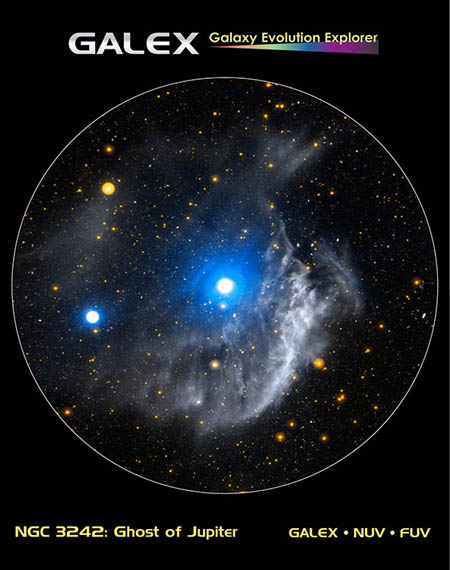dlw wrote: ↑Thu Jul 11, 2019 5:27 pm
Perhaps a naive question: is that yellowish object at the visual center of the Ghost the star that is dying or merely a fortuitous foreground object?
That's a very good question. The yellowish object is located pretty much exactly where the the dying (or dead) star, the ionizing white dwarf, ought to be. But it actually might be a foreground object! My software, Guide, shows
two stars inside the Ghost of Jupiter nebula, one 12th magnitude very blue star that Guide calls TYC 6065 671 1, and one 10th magnitude very red object that Guide calls HD 90255. But
Simbad says that HD 90255 is a blue 12th magnitude star! According to SIMBAD, this star is even "visually blue"! But apparently no actual visual-light picture of NGC 3242 shows the central star of NGC 3242 as blue.
(Though maybe it looks a little blue in
this image from Caelumobservatory.)
The Ghost of Jupiter in ultraviolet light.
Note the blue (= very ultraviolet) central star. Photo: GALEX.
Wide angle image of the NGC 3243 region.
Photo: Terry Robinson.
But whether or not the central star of NGC 3242 is blue in visual light, it is most certainly very ultraviolet. In the GALEX image at left, the central star glows brightly blue. In fact, if you look more closely, you will see that it seems to be the entire planetary nebula, not just the central star, that glows blue from far ultraviolet light in GALEX's image.
Note the nebulosity at right in the GALEX image, which is actually the nebulosity at left of NGC 3242 in Terry Robinson's image. Note, too, that in the GALEX image, there is a second blue (=very ultraviolet) star not far from NGC 3242. My software Guide shows me a blue star in more or less the right position which Guide calls TYC 6065 769, but unfortunately SIMBAD doesn't recognize that catalogue number, so I can't find out anything more about that star. But this "TYC 6065 769" is about the same visual magnitude as the (12th magnitude) central star of NGC 3242.
It could be that both the central star of the Ghost of Jupiter, and the hot ultraviolet star not far from it in the sky, are both too faint in visual light to show up as blue stars in any existing optical image of the region around NGC 3242.
Ann




